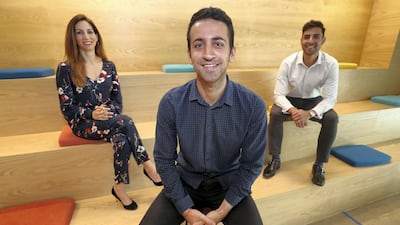Sarwa, a low-cost investment advisory platform that launched in Dubai last year, plans to expand its services to the wider Middle East and North Africa after securing $1.3 million (Dh4.7m) of funding from investors including Middle East Venture Partners, one of the region's largest venture capital firms.
The company aims to raise an additional $2m to $4m in a further financing round planned for 2019, said Mark Chahwan, chief executive and co-founder of Sarwa. "Up until now we've been very lean and focused on establishing ourselves in the UAE market, but now we can refine our product and grow," he said.
The company expects to obtain a full operating licence by the end of this month or in October. At present, Sarwa has a FinTech testing licence from the Dubai Financial Services Authority, which permits it to work with a limited number of clients in the UAE.
“We’ll soon be able to expand our reach,” Mr Chahwan said. The main targets are Saudi Arabia and Egypt, the largest markets in the region.
“Our business model requires scale, as it’s about democratising wealth management by dramatically reducing the cost of investment,” he said. Sarwa is seeing monthly growth of around 20 per cent with more than 1,000 registered users, it says.
Low-cost, or “robo”, advisers offer automated, low-fee, investment and wealth management services via digital platforms. The industry is relatively nascent and exists mainly in the United States and Canada, where Betterment, the biggest robo-adviser with an estimated $10 billion of assets under management, is the best-known example.
Global assets under management by robo-advisers are expected to grow by 68 per cent annually to $2.2 trillion by 2020, according to a 2015 report by consultancy AT Kearney.
Many countries in the Middle East are striving to become hubs for the FinTech sector, which is seen as a key driver of economic growth, and free zones including the UAE's Dubai International Financial Centre and Abu Dhabi Global Market have developed strategies to lure FinTech start-ups including robo-advisers.
Sarwa, which began operations in December as part of DIFC's Fintech Hive accelerator programme, claims to be the first regulated robo-advisory in the Middle East. Last year, Wahed Invest based in New York, which says it is the world's first Sharia-compliant robo-adviser, launched operations in the UAE.
Sarwa's pre-Series A funding round, completed this week, brings its total funding to more than $1.5m since inception, with capital from a range of global and regional VCs including MEVP, Abu Dhabi's Shorooq Investments, 500 Startups from California, Dubai's Women's Angel Investor Network, Saudi Arabia's Hala Ventures and Lebanon's Saned Partners, Sarwa said on Monday.
__________
Read more:
Generation Start-up: Low-cost investment firm Sarwa seeks to challenge industry's high fees
Exclusive: First Islamic robo-adviser to launch in Mena
The mission to improve ethics among UAE financial advisory firms
__________
The company will launch a mobile app next year to improve its reach and ease of use, and recruit three more staff to support planned growth, Mr Chahwan said. The company recently hired a compliance officer to help obtain the full operational licence.
Sarwa offers a range of portfolio models assigned to investors based on appetite for risk. The portfolios use six exchange-traded funds (four stock ETFs and two bond ETFs) from Vanguard and Blackrock, the two biggest ETF providers in the world.
Exchange-traded funds are traded like stocks on exchanges and the average fee ranges between 1 to 2 per cent. In comparison, robo-advisory companies can charge as low as 0.25 per cent in the US, while in Europe the average is 0.75 per cent. As a result, their services are increasingly popular with young professionals in underserved markets.
The Middle East is perceived as a high-growth market due to its young affluent population and high smartphone penetration, according to Sarwa, which says it charges an annual fee of 0.85 per cent per year to clients, on a monthly basis.
The minimum investment amount is $2,500 but the plan is to reduce this over time, its co-founder said.

